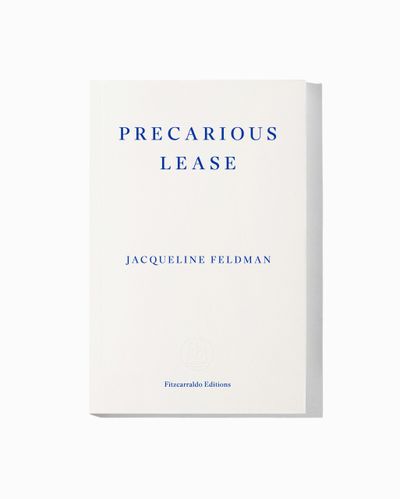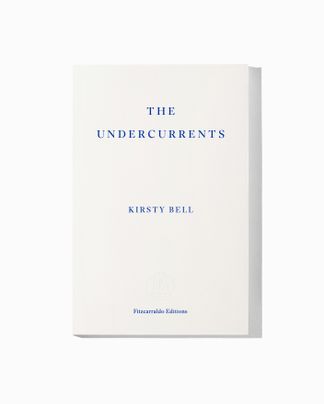In her extraordinary non-fiction debut, Jacqueline Feldman tells the story of Le Bloc, a legendary squat situated at the far edge of Paris, near where the banlieue begins. Opened in 2012, the squat took in artists and activists as well as immigrants from around the world. They lived and worked within its labyrinthine structure, continually threatened with eviction and existential as well as financial precarity. Over many years Feldman, a reporter from the US, follows a cast of itinerant, displaced characters, tracing the fate of a counterculture under austerity while investigating the trending use of a legal device by which squatters could receive a reprieve from eviction but were reduced in status to property guardians. In the tradition of Walter Benjamin and other chroniclers of Paris, she draws on its revolutionary and bohemian history while sounding issues of the most contemporary urgency about hospitality and refuge, creativity and precarity, ecology and utopia. With gripping candour and journalistic precision, Precarious Lease is a thrilling dramatization of late-stage possibilities for co-existence in the ruins of a capital city.

Precarious Lease
French paperback with flaps, 312 pages
Published 30 January 2025
Precarious Lease
0
There is a stretch of the Paris border where the city ends as if in a cliff. The natural slope of the land is visible in the hill of a park. Around it, accommodation for the rectilinear has been made, and buildings sit flat, the streets terraced. On the descent you pass the Métro Pré-Saint-Gervais, obscure stop of a circular. You cross the Boulevard Sérurier, one of twenty-two bending along the city’s perimeter and named for Napoleonic marshals. There are tramlines, taut of wire, and the Périphérique highway, the city’s ring road, which throws light. From there the suburbs fall away to the northeast, the land below them sinking. This view serves to dignify the area’s desultory pizza parlors, its bar, and its other bar, the one for placing bets.
I went there one October afternoon to look at a construction site. I had moved back to Paris after three years away, and I still knew this address by heart. It was written as if unsettled, as a range: 58-62, rue de Mouzaïa. A few more buildings and the road runs out, Sérurier taking the relay. I had come from that direction.
Because of the building’s location, because of its many tall windows, it could reflect the weather over the suburbs. Within Paris it served those suburbs as an embassy, as one of the occupants, one of the squatters, had long ago told me. Police had evicted those squatters in December 2013. Since then, for four years and ten months, the building had stood empty. It was empty as I took it in, in 2018. At a glance, I saw the windows had been replaced. A sign put up by the city indicated construction would run through 2020. But the glass was black and clean. The building’s stories, eight in number, glittered. Below them lay four basements.
I wouldn’t be able to see it in full. Corrugate hid a man who was shouting, a worker, a temporary wall. Concrete gapped to show metal supports, twisting, rusted. Across the first story snaked engravings, words, a 1974 work by the French sculptor Catherine Val. Menacing nouns, they were nearly oracular: Storm-Cold-Wind-Cold. Shaped like a hinge, the building was wider than it was tall. Caught in the fold of its wings was a sizeable courtyard where the occupants had, I knew, cultivated bamboo and, in their idiosyncrasy, trussed up a disco ball. Far oversized, ten feet across, it cast a fractured light into every room.
Yards away, a man was watching me. He stood still, as I did, and on the same sidewalk. The messy hair and baggy clothes scanned, from where I stood, as homelessness—I looked away. The stare could not be returned politely. He has the right, I thought—a French expression. I am looking at the city, and this man is looking at me. Moving, I also felt, would have provoked him, a feeling I was not exactly proud to register. Years ago we might have both gone on ahead into that building. I trained my attention on more signs hung by the municipal government, temporary, detailing the history of the place: something to read until 2020, consolation. Here, or around here, lay rebellious Belleville village, incorporated into Paris in 1860. Quarries came to my mind, as did defensive ramparts called the Thiers Fortifications. At their base extended a no-build zone on which drifters contrived shacks of sheet metal and scrap, building all the same. The architectural movement Brutalism had in the twentieth century bestowed on Paris this edifice for use by a regional Directorate for Health and Social Affairs. (The architecture was “inspired by ‘bunkers,’” as one could read in local news, Le Parisien.) I used my phone to photograph the signs. One gave the squat’s name, Le Bloc, an acronym of the squatters’ devising for bâtiment libre, “free building,” occupé citoyennement, “occupied by citizens” though with an adverb that is nonstandard, as “citizenly” would be in English. One look at it, and a homeless man comes and stares at you accusingly. The sign’s summary made much of “art” produced within but did not say what kind of art it was. A professional had told Le Parisien of an intent for “certain works” to remain. Many were murals, immovable. “Because there’s some very
interesting stuff,” the project manager continued. Their employer would be converting the building to housing for students and “young workers”—130 students, 65 workers, with 14 “artists” to be accommodated across the extent of a coworking space. The state had transferred title for 6.7 million euros, which amounted to a 76 percent discount. That renovation would cost twenty-two million. As far as deals go, the building wouldn’t move.
I looked up, and the man was gone.
I started back the other way. For most of its length, the Rue de Mouzaïa serves country-style houses—brick walks and fitted shutters, brimming planters—along a wall of which I saw a window only painted on. It was a decoy. Curtains had been depicted in billowing.
That street empties out into the Rue du Général-Brunet, which quickly flows into the Rue Botzaris, border for a crescent-shaped park, Buttes-Chaumont. On that street that day I recognized a boot-shaped sign, swaying above its clapboard storefront. In the months after Le Bloc’s eviction, in that quiet season, I had brought the cobbler my own boots, which I conceded had to be resoled. I passed them over the counter. He looked back in horror. They were too far gone. Nothing to be done. I had worn down the heels to triangles. I looked at those heels with the man, as he did, almost ashamed. I got home to find a letter from Le Général, which I recognized by my own handwriting. This was the envelope I had addressed, stamped.
(…)
‘Rigorous and arresting…. [Feldman] has thought deeply about the ethics of her work and the result is a beautiful and important book which, through its meticulous focus on a self-consciously marginal milieu, strikes at the centre of one of the urgent subjects of our time.’
— Max Liu, Financial Times
‘Precarious Lease is a stunning work of witness. And in the midst of the present inferno, it is precisely the rigorous work of fact-checked nonfiction that so effectively makes plain the head-spinning fictions of real estate and property value.’
— Claire Foster, Los Angeles Review of Books
‘Jacqueline Feldman’s Precarious Lease examines the beginning and the end – in 2013 – of the famous Parisian squat, Le Bloc, thinking through the triumphs and consequences of the unique leniency that Paris had shown towards the preservation of such indeterminate spaces…. Its lease was short but chaotic, resulting in the occupants’ eventual eviction; but its death throes bear lasting political and aesthetic echoes in our understanding of human habitation – in all its complex varieties.’
— India Lewis, Arts Desk
‘Feldman’s Precarious Lease is marked by erudition, astringence, biting wit, and the perspicacious awe of a seasoned examiner of our time, attributes bound to be hallmarks of her work for years to come. Diving under the rubble of social and class collapse, Feldman deftly maneuvers between investigative reportage and essayist forays while weaving through this tapestry a tone so sharp yet compassionate, so personal, it feels like a friend delivering dire news from the front lines of the world.’
— Ocean Vuong, author of On Earth We’re Briefly Gorgeous
‘In Precarious Lease Jacqueline Feldman follows her curiosity about alternate forms of living into the heart of north-east Paris’s squat scene, and takes the reader with her, asking fundamental questions about how we live together under late capitalism, and the relationship, in France, between freedom and bureaucracy, marginality and the state. It’s completely fascinating, an American in Paris memoir like no other.’
— Lauren Elkin, author of Art Monsters
‘Jacqueline Feldman’s Precarious Lease offers an enthralling immersion into the confluence of 2010s-era social and political activism, Parisian and French real estate and the margins of the global artworld. Multimodal in its storytelling, encompassing critical journalism, social history, the precision of documentary writing, and more, Precarious Lease also holds up a mirror to our current capitalist moment and suggests other ways of imagining our world.’
— John Keene, author of Counternarratives
‘To trust a writer’s insight, we must first trust their eyes, must be able to see what, how, and as they see. In Precarious Lease, Jacqueline Feldman trains her vision – indeed all her senses – on the striking, insistent particulars of the culture of squatters in Paris. Feldman assuredly, brilliantly, guides us through their unstable circumstances, through their fraught world. At every turn, the urgent, vivid, vitally empathic prose of Precarious Lease is grounded in a sense of our shared, our undeniable humanity. That is where revelation springs from. You heard me right: Jacqueline Feldman’s Precarious Lease is a revelation. This is a masterful, elegant, powerful book.’
— Richard Deming, author of This Exquisite Loneliness
‘Destined to become a classic of literary reportage, Precarious Lease: The Paris Document honors the poetry of facts in its vivid, boldly intimate depiction of artists and artists manqué struggling and dreaming in the squat houses of Paris and its peripheries. In its narrative sweep, the photorealism of its details, its sure grasp of cultural and subcultural history, its winsome and confiding tone, and its indelible portraits of eccentrics, rebels, and visionaries, Jacqueline Feldman’s deep-hearted and brilliant firsthand account offers us nothing less than utter enchantment.’
— Garielle Lutz, author of Worsted
‘Like the diary of Samuel Pepys, Precarious Lease is not so much reporting or even memoir as full-on history writing. Biased in the most important and necessary ways and at the same time telepathic, translucent, and hard-won, Feldman’s attempt at an account will make you rethink citizenship and all the hideous fictions associated with contemporary real estate. It will also remind you of the sacred and anarchic power of description.’
— Lucy Ives, author of Life is Everywhere
‘The authenticity with which [Feldman] renders her subjects on the page creates memorable characters and brings Le Bloc to life as a character in its own right. An atmospheric work of personal reportage that artfully renders the history and lived experience of Parisian squats.’
— Kirkus



